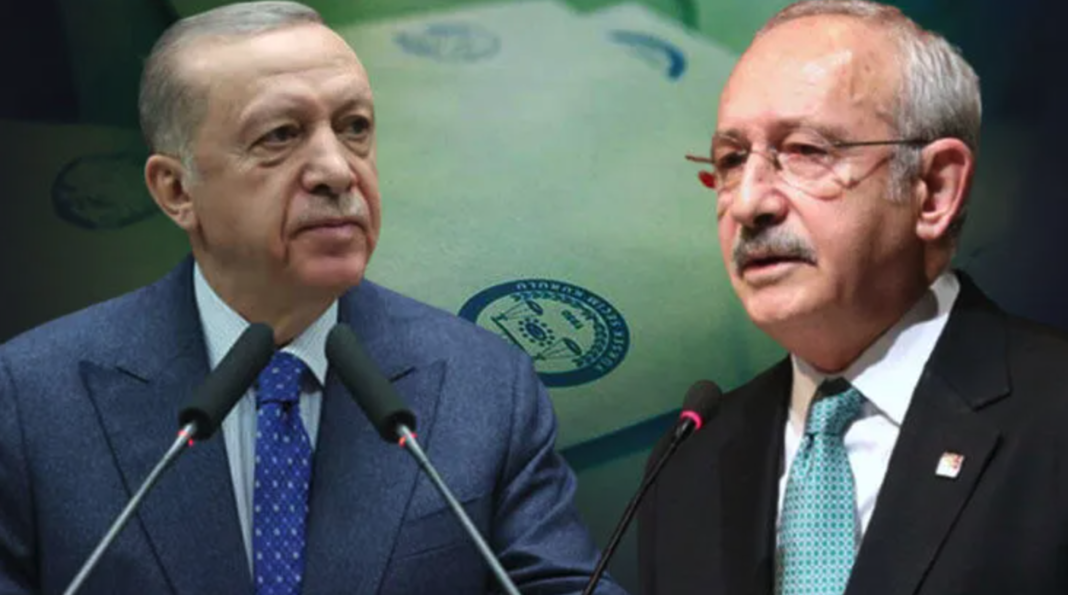Challenger Kemal Kilicdaroglu is showing signs of closing the gap on incumbent President Recep Tayyip Erdogan. By Andrew Wilks in Al-Monitor on April 3, 2023.
With Turkey’s presidential and parliamentary elections less than six weeks away on May 14, public opinion polls are showing a tight contest between the two dominant candidates President Recep Tayyip Erdogan and opposition leader Kemal Kilicdaroglu.
Over the weekend one of Turkey’s most respected polling companies, MetroPoll, revealed that its March research on voters’ attitudes showed a slender 2.6% lead for Kilicdaroglu, who heads the Republican People’s Party (CHP) and is the candidate of the Nation Alliance.
Results from MetroPoll’s research since the start of the year saw Kilicdaroglu closing the gap. Support for Erdogan fell from 45.9% in January to 42% in March — a period that saw Turkey hit by devastating earthquakes, leading to criticism of the government’s response — while those backing Kilicdaroglu rose from 43% to 44.6%.
However, further details show a more nuanced picture in the race between the two favorites.
Responding to the question of whether Kilicdaroglu would win the May 14 race, which could go to a runoff two weeks later if no candidate receives more than half of the votes, 43% said he would win while nearly 50% said he would not.
However, a growing number of people expect a Kilicdaroglu victory, up from nearly 32% in December, when some 60% said he would not win. “In three months, the gap has closed to a great extent,” MetroPoll director Ozer Sencar said.
The same question about Erdogan saw some 48% expecting the president to cement his third term of office while 45% said he would lose.
Asked their likelihood of voting for Kilicdaroglu, nearly 45% responded positively while more than 49% said they would not. Meanwhile, nearly 44% said they would back Erdogan and 52% refused to support his candidacy.
Commenting on Kilicdaroglu’s 2.6% lead, Sencar said the data showed that “the fate of the election will be determined by Muharrem Ince and the undecided.” Ince is one of the four presidential candidates. He stood against Erdogan for the CHP-led alliance in the 2018 election, when he was defeated in the first round.
Soner Cagaptay, director of the Turkish Research Program at the Washington Institute, said Ince and the other candidate, Sinan Ogan, could drain votes from Kilicdaroglu, “divide the opposition on May 14 and take the race to a runoff on May 28.”
Other polls have shown greater levels of support for Kilicdaroglu. TAG Research last week showed the CHP leader at nearly 51.8% while Erdogan polled 42.6%. The other candidates, Ince and Ogan, received 3.2% and 2.5%, respectively.
In the partisan world of Turkish opinion polls, however, there are some predicting a win for Erdogan. A survey carried out by Optimar Research in March showed Erdogan ahead at 47.4% while Kilicdaroglu followed at 45.3%.
Among voter groups, research points to women and young people favoring the opposition.
Research published Thursday by the Social Democracy Foundation on women’s voting intentions in the parliamentary election, which is to be held alongside the presidential vote, showed a switch from Erdogan’s Justice and Development Party (AKP) to the CHP.
Some 38% of respondents said they cast their ballots for the AKP in the 2018 parliamentary election but only 27% said they would vote for the ruling party in an immediate election. While 28% said they backed the CHP in 2018, that figure rose by two percentage points in the forthcoming vote.
Another crucial demographic is young voters. Some six million people will vote for the first time next month, a group that has known nothing but Erdogan’s 20-year rule. Around 13 million voters under the age of 25 will take part.
According to Erdal Akaltun, president of Bupar Research and Consultancy, eight out of 10 young people will vote for candidates from outside the AKP-led People’s Alliance.
“The possibility of a change in power in the existing order for the first time excites the youth,” Akaltun said, citing a recent survey by his firm.
Edgar Sar, cofounder of the IstanPol Institute, said most young voters had been influenced by the government’s increasingly authoritarian approach.
“Generation Z was 15 years old during the Gezi Park period in 2013,” he said, referring to nationwide anti-government protests a decade ago. “From that age, they saw the period when the AKP started to become authoritarian and they could not access the social opportunities that the previous generation had.”

